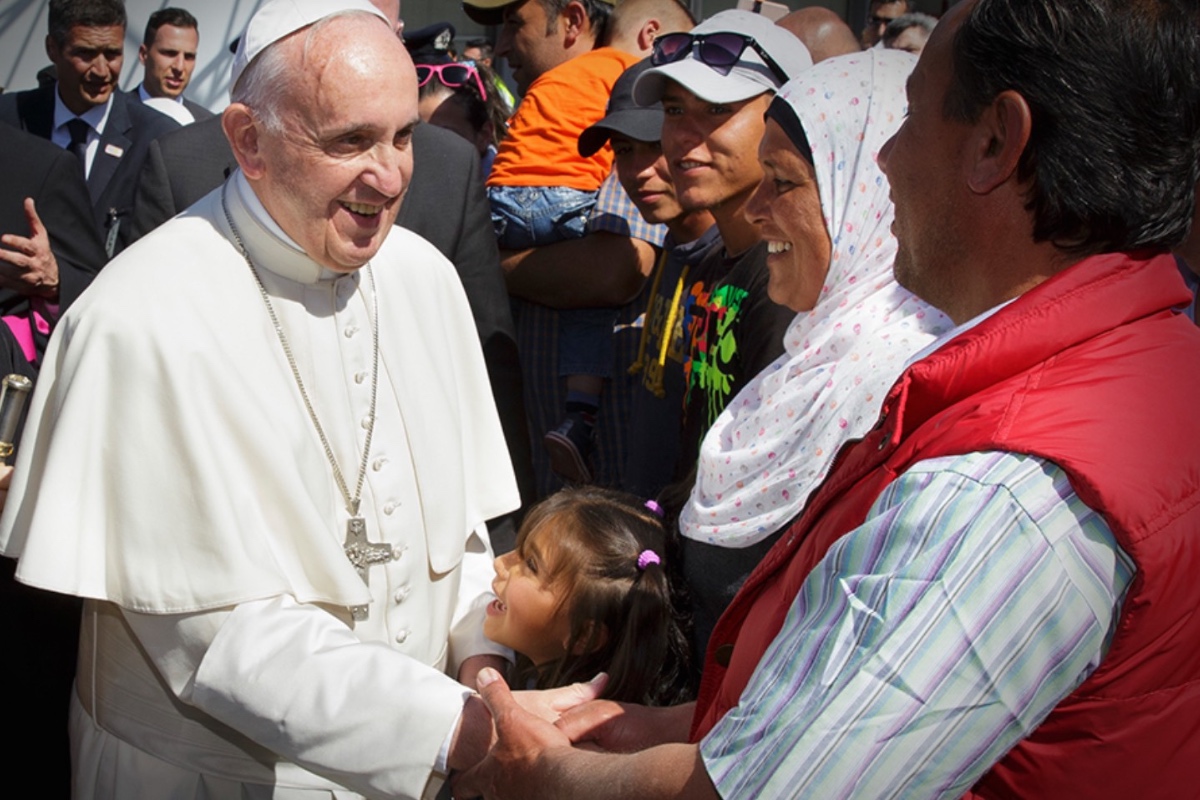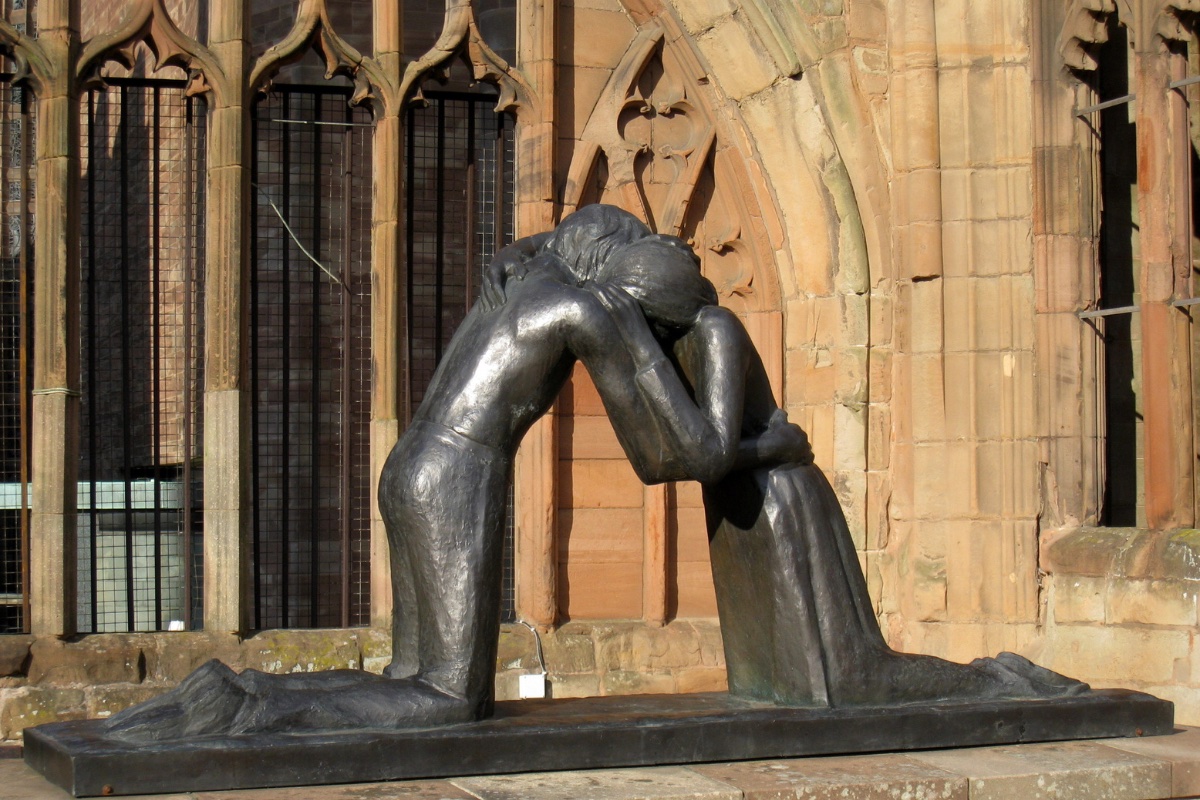Pope Francis’ gestures of solidarity with migrants were central to his papacy, from his repentance in the “graveyard of wrecks” of Lampedusa to his lived example returning from Lesbos with refugee families.1 His bridge-building theology is evident in his written reflections on migration, as well. He underscored structures of injustice that treat migrants like pawns on a chessboard and joined repentance from harmful idolatries with a recognition of our fundamental relatedness in light of the harm borders wreak.
Francis’ initial embrace of a church for the poor became a continuous refrain, reverberating in his charge to the Church as field hospital and summons, rooted in the Gospel, to a revolution of tenderness. In Evangelii gaudium Francis warned against the danger of dwelling in the realm of ideas and rhetoric alone, insisting on the priority of reality: “We want to enter fully into the fabric of society, sharing the lives of all, listening to their concerns, helping them materially and spiritually in their needs, rejoicing with those who rejoice, weeping with those who weep; arm in arm with others, we are committed to building a new world” (no. 269). Hence a praxis of justice and mercy for migrants must be not only mindful of the dynamics of social sin and complicity but concretely grounded in practical encounters across difference.
This commitment to bridge-building for the common good swims against significant cultural tides beyond anti-immigrant sentiment, each of which hardens resistance to communitarian claims. The all-American credo that we pull up our bootstraps and make our own fate is as entrenched as it is incompatible with the reality that we share each other’s fate. The Catholic conception of the common good radically challenges a culture that prioritizes economic efficiency over solidarity with the weak and marginalized, or narrow national interest over global concern, a culture in which “good fences make good neighbors” due to isolationist fears significantly hinders bridges toward common goods. Fear of the other is easily mass-marketed; mutual understanding across difference is more difficult to realize.
To “become islands of mercy in a sea of indifference,”2 Christian leaders must forge common ground across difference and yet be unafraid to condemn destructive policies and practices that harm children, separate families, and roll back historic protections. A bridge-building hospitality that welcomes the least may also entail prophetic resistance: think of Bishop McElroy insisting “we must all be disruptors”3 at the US Regional World Meeting of Popular Movements in 2017 or Cardinal Joseph Tobin accompanying a New Jersey grandfather to his ICE hearing that same year.
To “become islands of mercy in a sea of indifference,” Christian leaders must forge common ground across difference and yet be unafraid to condemn destructive policies and practices...
Preaching and advocacy should frame our complicity in generating migration flows rather than treating this as an unexpected “crisis” or “invasion.” For example, it should expose how consumers directly benefit from underpaying for goods and services and politicians benefit from unfounded scapegoating. In drawing attention to relevant history and complicity in this way, Catholic leaders can appropriately frame a response to refugees in terms of human rights and restorative justice, not optional largesse. In particular, they should remind people in the pews that the Catholic social tradition makes a preferential option for the vulnerable, not a preferential option for the innocent. Catholic communities can also humanize the perceived “onslaught” of refugees with parish-based outreach programs, testimony sharing, and educational programming. They have an opportunity to connect biblical journeys of migration with those undertaken by desperate asylum seekers today.
Catholic parishes are one of few places that minister to people on all sides of the immigration issue. In terms of recommendations for fostering difficult dialogues on this topic, the following practical recommendations are offered for consideration:
- Guard against xenophobic rhetoric, scapegoating, and conspiracy theorizing. Reasonable people can disagree about border policies without demonizing immigrants or one another. Counteract myths about immigrants and refugees while remembering that our own “deep stories” can tempt us to select facts, too. Be mindful that migrants may be in particular need of allies to amplify their voices amid climates of increased fear and intimidation.
- Break through not only “soap bubbles” of indifference but also insulating echo chambers. Risk difficult conversations with family members and colleagues with whom you disagree and try to identify common values. Too often we “agree to disagree” and remain confirmed in our perspectives by selective news and social media feeds, avoiding underlying differences at the root of immigration disputes. Participate in parish or other community programming that takes you outside of your typical social circles or comfort zone.
- Avoid amnesia at national and personal levels alike. Get curious about your own immigration family histories and how they have shaped your attitudes regarding the current situation. Invite others to do the same. Investigate how your present habits—purchasing, eating, child care, voting practices—impact the well-being of migrants and make a change. Pressure your elected officials and goods/service providers to do the same.
In the southern Mediterranean, Pope Francis shared in the grief and anguish of forced migrants—moved by the humanity of the Eritreans he met and provoked by the inhumanity of those numb to their plight. May we too repent of our complicity and move out of our comfort zones to “become islands of mercy in a sea of indifference.”
Kristin E. Heyer holds the Joseph Chair in Theology at Boston College, where she is professor of theological ethics.
The article is an excerpt from “Becoming Islands of Mercy in a Sea of Indifference: Migration, Social Sin, and Conversion,” in Thomas Kelly and Robert Pennington (eds.), An Ethic for Bridge Building: Pope Francis’ Practical Theological Approach (Herder & Herder, 2020).
Photo credit: Jim Urquhart for NPR. Unsheltered migrants wait for bed space to open for the evening in the gymnasium at Sacred Heart Church after crossing the Rio Grande into the United States in El Paso, Texas (2022).
Sources:
This is an excerpt from “Becoming Islands of Mercy in a Sea of Indifference: Migration, Social Sin, and Conversion,” in Thomas Kelly and Robert Pennington eds., Bridge Building: Pope Francis’ Practical Theological Approach (Herder & Herder, 2020) 77-91.
- Portions of this chapter are adapted from Kristin E. Heyer, Kinship Across Borders: A Christian Ethic of Immigration (Washington, D.C.: Georgetown University Press, 2012); Heyer, “Internalized Borders: Immigration Ethics in an Age of Trump,” Theological Studies 79, no. 1 (2018): 146–64; “‘An Echo in Their Hearts’: The Church in Our Modern World,” New Theology Review 28, no. 1 (2016): 5–13; and “Social Sin, Economic Inequality, and the Common Good,” in Pope Francis and the Challenge to Prioritize Poverty, ed. David DeCosse, Mike Duffy, and Erin Brigham (San Francisco: Lane Center Series, 2015).
- Pope Francis, “‘Make Your Hearts Firm’ (Jas 5:8)”, 4 October 2014, https://www.vatican.va/content/francesco/en/messages/lent/documents/papa-francesco_20141004_messaggio-quaresima2015.html
- Bishop Robert McElroy, “Message to Participants in the U.S. Regional Meeting of Popular Movements,” February 16-19, 2017, http://cms.usccb.org/about/justice-peace-and-human-development/upload/BishopMcElroyUSWMPMEnglish.pdf.





